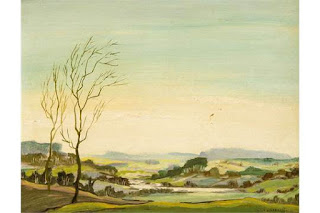This post is the result of about 20 years of research and accidental discoveries, and concerns the origins of the phrase "Mouldy Old Dough".
I first heard the phrase as the title of the superb 1972 No.1 UK hit by Lieutenant Pigeon. But what I found quite curious was that John Lennon also mentions this phrase in an apparent ad-lib during the song "Ain't She Sweet" (Ager/Yellen). This would be the 24th July 1969 version that appears on the Beatles Anthology 3 collection.
Why would John Lennon utter the title of a song yet to be recorded? I initially thought this phrase must be part of (un)common English parlance. Perhaps a slang term used in the English Midlands?
The Anthology 3 inlay says the Beatles 1969 version of "Ain't She Sweet" closely follows the Gene Vincent 1956 version, but his version omits the phrase.
I was puzzled by this curious phrase and song title : what were its origins and was there some underlying meaning to the phrase? Perhaps something more that a straightforward reading might otherwise suggest?
This remained a puzzle for many years until I heard Harry Reser's Six Jumping Jacks jaunty 1926 hit-tune "Lo-do-de-o" - the wonders of Shazam allowed me to quickly identify the artist. The phrase "Lo-do-de-o" is mentioned several times in the song. For example, this phrase is sung at 1m13 and again even-more-clearly at 1m30, where it sounds indistinguishable from "Mouldy Old Dough".
The lyrics also provide a hint at a meaning, and perhaps unsurprisingly, the phrase appears to be a synonym for sex.
Take my advise and learn how to do it,
You'll find there's nothing to it,
If you like a-her and she likes a-you,
You like a-love and a-bill and a-coo,
Learn how to sing and a-play and a-do,
that mould-dough-de-old dough
Once I'd identified that "Lo-do-de-o" or "Mouldy Old Dough" is a piece of 1920's jazz-era slang, I found a number of further similar-sounding occurrences. It seems likely that this phrase could be used to refer to sex and avoid the censors.
Other later appearances include the 1927 songs "Crazy Words, Crazy Tune" and "Vo-Do-Do-De-O Blues" both by Ager/Yellen. However, neither of these sound as similar to the "Mouldy Old Dough" example found in the 1926 Harry Reser recording.
"Crazy Words, Crazy Tune" (Ager / Yellen)
Irving Aaronson and his Commanders in 1927
Johnny Marvin in 1927
Frank Crumit also in 1927
Savoy Havana Band in 1927
Winifred Atwell in 1952
Jim Kweskin Jug Band in 1963
"Vo-Do-Do-De-O Blues" (Ager / Yellen)
California Ramblers in 1927
The Goofus Five in 1927
The Temperance Seven in 1961
Furthermore, the phrase "Vo-De-Oh-Do" appears in the closing seconds of the late-1966 No.1 UK hit "Winchester Cathedral" by The New Vaudeville Band.
However, all these other songs and versions post-date Harry Reser's July 1926 recording of "Lo-do-de-o" song which is the earliest known appearance of this phrase.
This song was recorded in July 1926 and was first released on Brunswick no.3252-B [ref: Brunswick Records: A Discography of Recordings, 1916-1931, Volume 1]
This appears to be the origin of the phrase, but I still find it quite strange that John Lennon should repeat this phrase in 1969. The most likely explanation is that he'd heard Harry Reser's 1926 song, or perhaps the phrase uttered during the refrain of the 1966 No.1 record "Winchester Cathedral" was his source?
Do any other earlier recordings or sources of this phrase exist? If you know of any, please add a comment.





